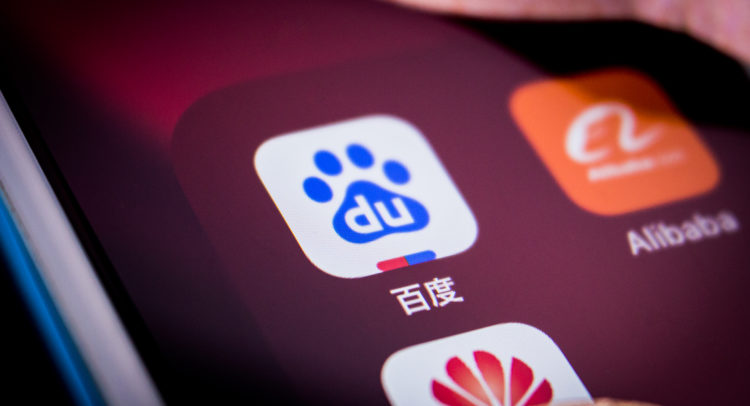Growing fears of a recession around the world are weighing on retail stocks, and for Chinese e-commerce greats Alibaba (BABA) and Baidu (BIDU), it’s no different. While the latest quarter offered better than expected results, the future looks a little less bright for these two. Moreover, issues not even related to the macroeconomic picture still lurk in the background.
For those reasons, I’m bearish on both Alibaba and Baidu. There’s a lot of reason to like these companies, but the immediate future looks a bit more perilous than I’d like.
For Baidu, the last 12 months have featured a rather sharp drop, as the company that broke $200 back last May nearly dropped to half that a year later. Meanwhile, Alibaba—which held onto the over $200 mark well into June—has likewise slipped to even under $90 in recent trading.
The latest news for both provides short-term reassurance and long-term concern. Baidu turned in its earnings report, which featured revenue of 28.41 billion yuan (roughly $4.22 billion U.S.) against Refinitiv’s projections calling for 27.82 billion yuan. The company has not issued guidance since October 2021, however.
Meanwhile, Alibaba saw its own beat based on last quarter’s figures. Alibaba posted revenue of 204.05 billion yuan (roughly $30.35 billion U.S.), against projections calling for 200.6 billion yuan. Likewise, the company did not issue projections for full-year revenue, citing ongoing concerns connected to COVID-19.
Wall Street’s Take
Turning to Wall Street, Baidu has a Strong Buy consensus rating. That’s based on one Buy, three Holds, and four Sells assigned in the past three months. The average Baidu price target of $215.54 implies 60% upside potential.

Analyst price targets range from a low of $125 per share to a high of $285 per share.
Meanwhile, Alibaba also has a Strong Buy consensus rating. That’s based on 18 Buys assigned in the past three months. The average Alibaba price target of $171.07 implies 81.6% upside potential.

Analyst price targets range from a low of $132 per share to a high of $276 per share.
Investor Sentiment Varies Wildly – If You Can Find It
For both Baidu and Alibaba, it’s a bit more difficult to track investor sentiment due to some differences in reporting. However, both carry solid Smart Scores on TipRanks. Baidu carries a Smart Score of 8 out of 10, the lowest level of “outperform.” Meanwhile, Alibaba carries a Smart Score of 7 out of 10, which is the highest level of “neutral.”
Insider trading is impossible to track for both companies. No insider trading data is available for either Baidu or Alibaba.
Hedge fund involvement, however, is a different matter. Based on the results from the TipRanks 13-F Tracker, Baidu’s involvement ticked up this quarter. Baidu went from just under 22 million shares owned to just under 23 million shares.

Meanwhile, Alibaba saw a similar slight uptick in hedge fund ownership as well. Alibaba went from just under 80.8 million shares to just under 81.5 million shares owned.

As for retail investors who hold portfolios on TipRanks, both Baidu and Alibaba are increasingly eschewed by those investors. Baidu saw ownership drop 0.6% in the last seven days and a drop of 2.9% in the last 30 days.
Meanwhile, Alibaba saw a drop as well, though not quite so pronounced. Alibaba lost 0.4% of TipRanks portfolio holders’ interest in the last seven days and lost 0.9% in the last 30 days.
Neither Baidu nor Alibaba, meanwhile, has issued a dividend. Nor does either company show any plan to do so in the near term.
Big Risk, Potentially Big Reward
I will not say that there’s not a reason to buy in on either Baidu or Alibaba. If you’ve got the strength of your convictions that the likely recession facing the planet in the coming months isn’t going to hit that hard, then both of these could be excellent buys.
Both are trading significantly off their highs for the year. Alibaba is actually trading under its lowest price target. Baidu isn’t quite that far down, trading at about $9 above its lowest price target. These are attractive buy-in points if you believe a turnaround is likely.
Plus, Baidu has a very attractive notion going for it as well. The company has been working to move from online marketing to several hardware platforms. Baidu works in self-driving systems, chips, and even cloud computing.
If that sounds a lot like Alphabet (GOOG) in the making to you, too, you’re definitely not alone. Inflation is pummeling consumers. Advertising is on the decline in response. That makes it no surprise that a business is going to work to diversify out of marketing if it can.
However, there’s still the elephant in the room to consider: the Party. The Chinese Communist Party has tanked several of its country’s own stocks in the last few months over several tech-sector crackdowns. For it to turn around and do so again seems less like a vague possibility and more like a matter of time.
The second elephant in this increasingly crowded room, meanwhile, comes from the Securities and Exchange Commission (SEC). The SEC has already expressed dissatisfaction over Chinese stocks’ reporting methods.
It recently noted that “significant issues remain” around Chinese reporting transparency and the SEC’s resulting ability to audit Chinese firms. If this continues insufficiently addressed much longer, the SEC may well step in to delist the firms from U.S. exchanges.
That, in turn, would severely hamper investors’ ability to buy in and, thus, limit the available capital for these firms to draw on.
Concluding Views
If I absolutely had to buy at least one of these stocks, it would probably be Baidu. Baidu has been diversifying its internal portfolio nicely, spreading outward from advertising to building into a range of new options.
Sure, most of these will be hit by a potential upcoming recession, but spreading out that far helps lessen the impact. Alibaba, meanwhile, still relies quite a bit on disposable income, and that’s going to particularly hurt it.
I’m bearish on both companies, certainly. The ongoing specters of U.S. delisting and Party interference don’t bode well for either operation right now. Throw in a massive inflationary recession in the works, and that’s going to crimp the disposable income hose still further.
Baidu may be more likely to come out on the other side than Alibaba. However, despite the attractive pricing, neither company’s prospects look all that healthy right now.
Read full Disclosure









